Imagine the scenario: You are investing in hours of work, dedicating resources, and doing everything you can to build a high-performing team.
However, it feels like you are trying to hold onto the wind.
Your team’s performance is not improving. Their morale is low, and you are struggling to achieve your targets.
Does this sound familiar to you?
You can almost taste the success of a high-performing team, yet it seems difficult to achieve, teasingly far off, like a mirage in the desert.
It is a common struggle in today’s fast-paced corporate world. You are not alone in this, and it’s definitely not your fault.
I can understand the frustration of missed deadlines and underachieved targets. It feels like you are stuck in a maze with no escape.
Now, let’s dream about having an efficient, high-performing team. Team members are not only meeting but exceeding their targets. Every team member’s morale is sky-high.
It sounds so amazing, doesn’t it?
Well, that’s what “The Ultimate Playbook for Building High-Performing Teams in 2023” is all about. It’s like a guide to build a high-performing team and get us onto the road to success.
So, let’s start this journey together!
Characteristics of high-performing teams
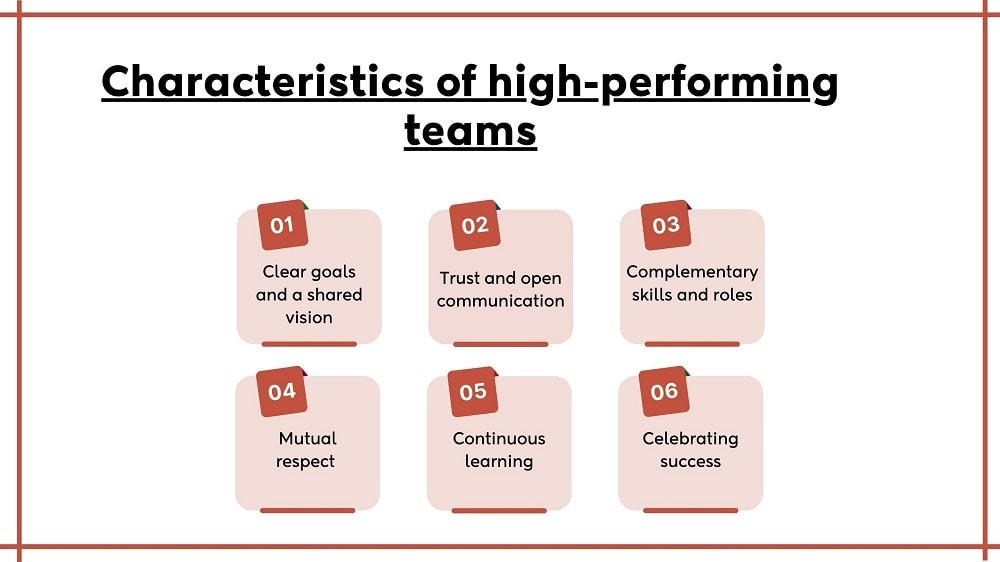
High-performing teams have some key characteristics that set them apart from the rest.
Here are a few characteristics that define a high-performing team:
- Clear goals and a shared vision
According to research conducted by Quantum Workplace, employees who have clearly defined goals are 2X more likely to be engaged in their work.
High-performing teams have a clear understanding of their goals and objectives.
They also have a shared vision for what they want to achieve.
This gives everyone on the team a sense of purpose and direction.
- Trust and open communication
High-performing teams are built on trust and open communication.
Team members feel safe to share their ideas, opinions, and concerns without fear of judgment.
This leads to better problem-solving and decision-making.
- Complementary skills and roles
High-performing teams are made up of people with a variety of skills and experience.
This allows them to draw on each other’s strengths and expertise to achieve their goals.
- Mutual respect among leaders and team members
High-performing teams are characterized by mutual respect.
Everyone on the team is valued for their contributions, regardless of their position or title.
This creates a positive and supportive work environment.
- Continuous learning and growth
High-performing teams are always learning and growing.
They are eager to take on new challenges and develop their skills.
This helps them to stay ahead of the curve and achieve their goals.
- Celebrating success and recognizing contributions
Did you know that 70% of highly engaged employees had a positive view of the statement “If I contribute to the organization’s success, I know I will be recognized”?
High-performing teams celebrate their successes and recognize the contributions of individual team members.
This helps to maintain a positive team spirit and motivates everyone to keep working hard.
Why are high-performing teams important?
As a member of a high-performing team, I know that we can achieve anything we set our minds to.
We have the skills, the expertise, and the drive to succeed. We trust each other implicitly and are always willing to share our thoughts and feedback.
Even during tough times, we can quickly adjust to changes and work together under pressure.
This is the power of a high-performing team.
The benefits of building high-performing teams
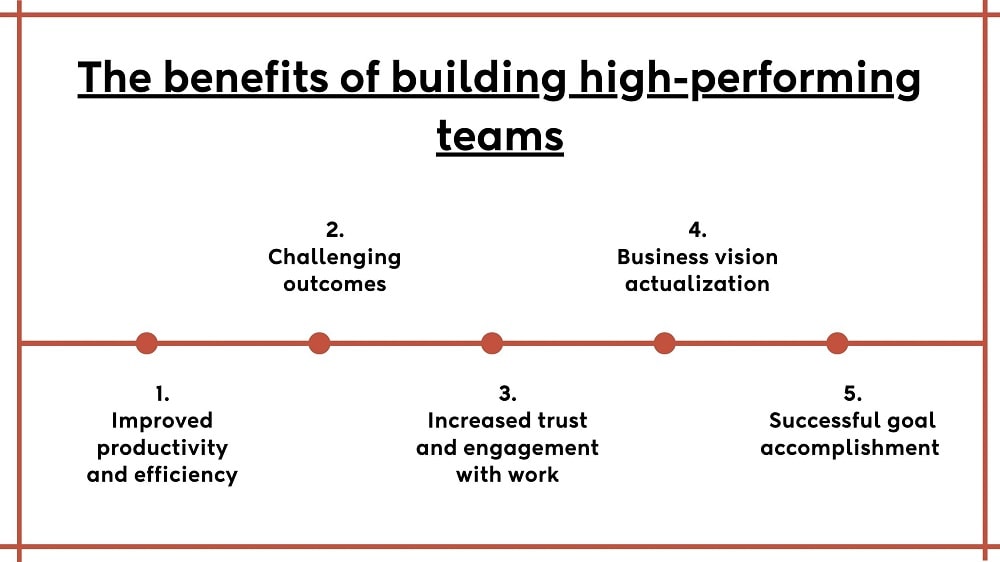
Below are the benefits of building and continuously developing high-performing teams in the workplace:
- Improved productivity and efficiency
When team members work together effectively, they accomplish more in less time.
This is because they can leverage each other’s strengths and expertise, and they are more likely to identify and implement best practices.
- Challenging outcomes
Teams are not afraid of taking on tough challenges.
They are confident in their abilities to work together to overcome any obstacle.
This makes them ideal for tackling complex projects and initiatives.
- Increased trust and engagement with work
A research by Deloitte shows that highly engaged teams are 57% more effective, 87% less likely to lose employees and achieve 2.3 times higher revenue growth than less engaged teams.
That’s what high-performing teams reflect in their work. When team members trust and respect each other, they engage more in their work.
They share their ideas and collaborate effectively.
This leads to a more positive and productive work environment.
- Business vision actualization
High-performing teams align their goals with the company’s overall objectives and work together to achieve them.
This leads to improved performance and outcomes for the entire business.
- Successful goal accomplishment
Teams are consistently successful in accomplishing high-priority objectives.
For the reason that they can quickly and effectively identify and address challenges.
They’re always looking for ways to improve.
As a result, businesses can achieve their goals faster and with greater success.
How do high-performing teams differ from other teams?
High-performing teams have a special sauce that sets them apart.
I’ve learned firsthand a thing or two about what makes them tick.
Here are a few critical differences between high-performing teams and other teams:
1. Embrace innovation and adaptability
High-performing teams are not afraid to try new things.
They are constantly looking for ways to improve their processes and products.
They are also adaptable to change, and they can pivot quickly when needed.
2. Collaborate cross-functionally with other teams and departments
High-performing teams know that they can’t achieve their goals alone.
They collaborate effectively with other teams and departments to share resources, ideas, and expertise.
This allows them to pool their strengths and create more innovative and impactful solutions.
3. Recognition and achievements
High-performing teams celebrate their successes and recognize the contributions of individual team members.
This creates a positive and supportive work environment where everyone feels motivated to do their best.
4. Performance processes & technology
High-performing teams use data and analytics to track their progress and identify areas for improvement.
They also use technology to automate tasks and streamline their workflows.
This frees them up to focus on more strategic work.
5. Mutual accountability
High-performing teams understand that they’re all in this together.
They hold each other accountable for their performance and support each other through thick and thin.
This creates a strong sense of teamwork and commitment.
How to build a high-performance team?
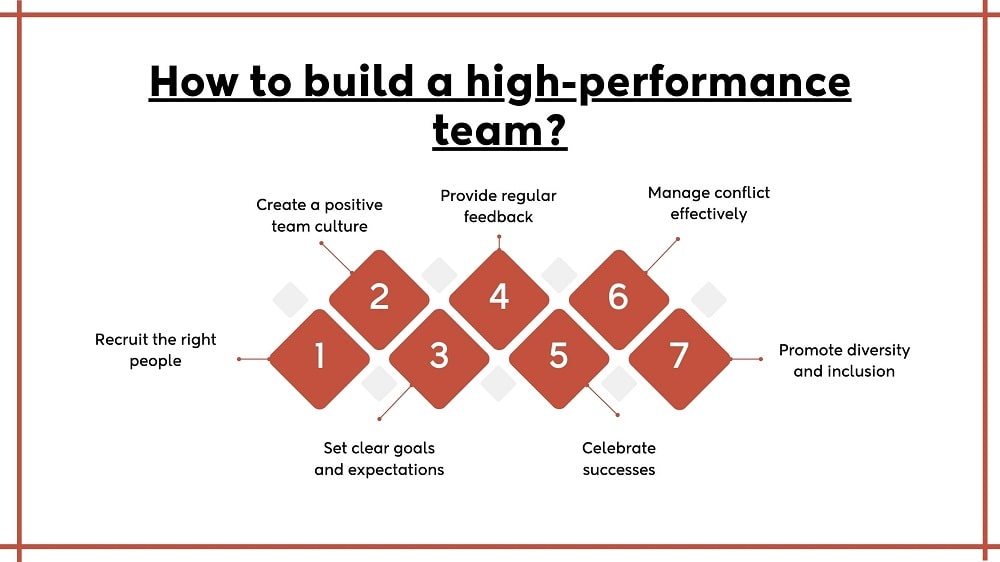
Now comes the real question. How to build a high-performance team?
So, without further ado, have a look:
1. Recruit the right people
Your team is only as strong as its weakest link.
So, it’s important to recruit people who are skilled, motivated, and a good fit for your team culture.
2. Create a positive team culture
A positive team culture is one where everyone feels valued, respected, and supported.
Encourage team members to collaborate, share their ideas, and learn from each other.
Create a space where everyone feels comfortable taking risks and making mistakes.
3. Set clear goals and expectations
Make sure that everyone on the team understands the team’s goals and how their work contributes to achieving those goals.
Set clear expectations for performance and provide regular feedback.
4. Provide regular feedback
Feedback is essential for helping team members learn and grow.
Provide both positive and constructive feedback regularly.
Be specific and actionable in your feedback.
5. Celebrate successes
According to a study by Achievers, 70% of employees say that motivation and morale would improve if managers celebrated success more often.
When the team achieves a goal, take the time to celebrate their success.
It will help to boost morale and motivation.
6. Manage conflict effectively
Conflict is inevitable in any team environment.
It’s important to be able to manage conflict effectively so that it doesn’t damage the team.
Encourage team members to communicate openly and honestly with each other.
7. Promote diversity and inclusion
A diverse and inclusive team is a stronger team.
Promote diversity and inclusion in your team by hiring from different backgrounds and experiences.
Create a team culture where everyone feels welcome and valued.
By following these tips, you can build a high-performance team that is productive, efficient, and innovative.
Challenges to building and sustaining high-performing teams
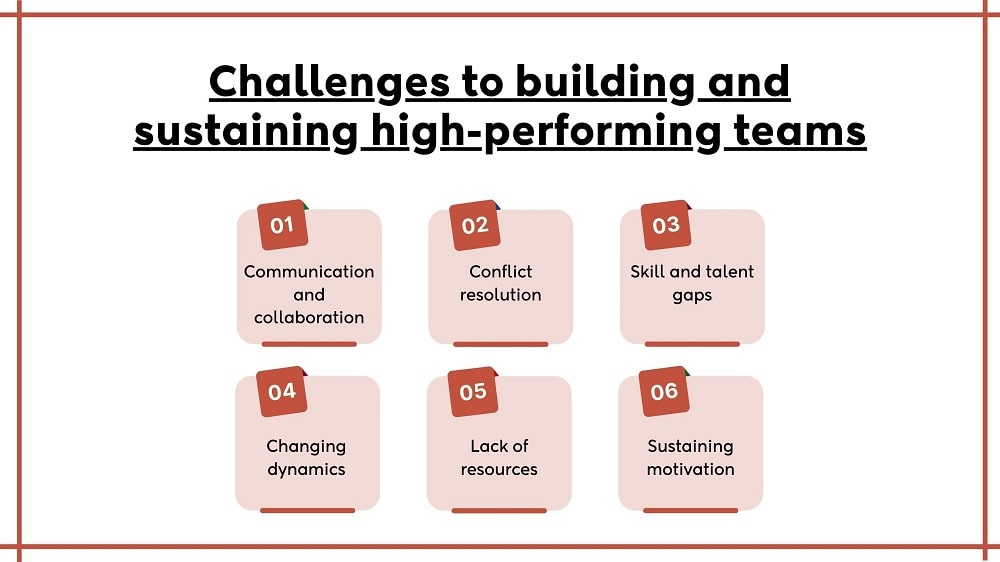
Building and sustaining high-performing teams is no easy task.
Here are some of the biggest challenges my team has faced:
- Communication and collaboration
It is a tough task to get everyone on the same page, especially when team members have different communication styles and work preferences.
You must create a culture of open communication and collaboration, where team members feel comfortable sharing their ideas and working together to achieve common goals.
- Conflict resolution
Disagreements are inevitable, but resolve them in a healthy way that doesn’t damage the team.
Create a team culture where team members feel comfortable expressing their disagreements and working together to find solutions.
Encourage open and honest communication, and avoid personal attacks.
- Skill and talent gaps
Every team has its strengths and weaknesses.
Identify any skill or talent gaps on the team and develop a plan to address them.
This could involve providing training, hiring new team members, or delegating tasks to team members with the necessary skills.
- Changing dynamics
Teams are constantly evolving, as people come and go.
Adapt to these changes and ensure that the team remains cohesive and productive.
When team members come and go, take the time to update team roles and responsibilities.
Make sure to regularly check in with team members to see how they are doing and what they need to be successful.
- Lack of resources
Teams need the right tools and resources to do their best work.
When resources are limited, it is difficult for teams to achieve their full potential.
There are often ways to find the resources you need without breaking the bank.
For example, you can borrow resources from other teams, look for free or low-cost online resources, or ask for donations from sponsors.
- Sustaining motivation
It can be challenging to keep team members motivated, especially over the long term.
Set clear goals, provide regular feedback, and celebrate successes.
It’s also important to create a positive and supportive team culture where team members feel valued and respected.
If you’re facing any of these challenges, don’t worry.
You’re not alone.
Every team faces challenges, but the most successful teams are the ones that have learned to overcome them.
Skills to master to lead a high-performing team
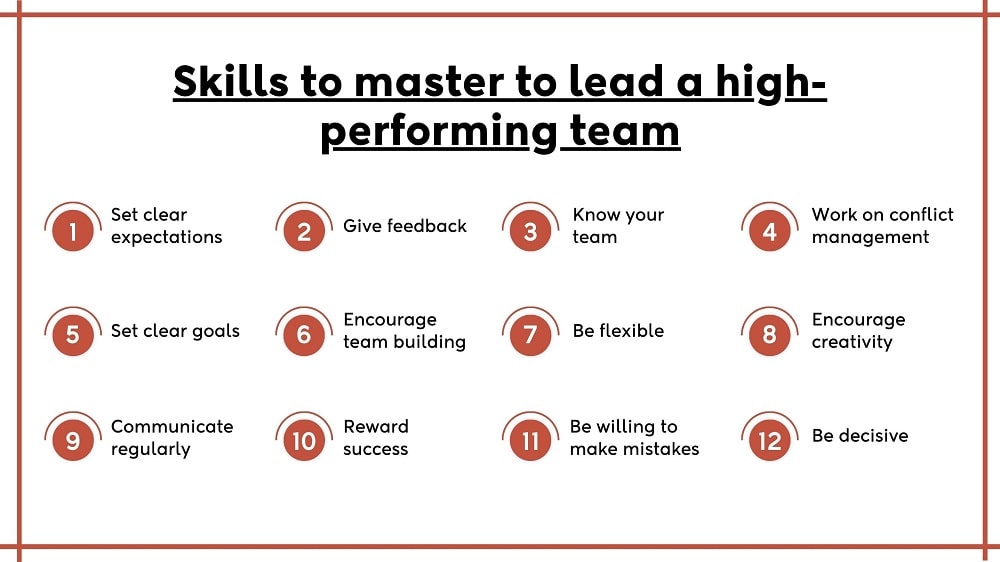
According to IMD Business School, there are 12 essential skills that leaders of high-performing teams must master:
1. Set clear expectations
Everyone on the team should know their role and what’s expected of them.
This will help to avoid confusion and conflict.
2. Set clear goals
The team should have a clear understanding of what they’re trying to achieve.
This will help to focus their efforts and motivate them to succeed.
3. Communicate regularly
Communication is key to any successful team.
Leaders need to communicate effectively with their team members, both individually and as a group.
4. Give feedback
Feedback is essential for team members to grow and develop.
Leaders need to provide both positive and negative feedback in a constructive way.
5. Encourage team building
Team building activities help to build trust and rapport among team members.
This can lead to improved communication and collaboration.
6. Reward success
When the team achieves a goal, it’s important to recognize and reward their efforts.
This will help to motivate them and keep them engaged.
7. Get to know your team members on an individual level
Leaders need to understand their team members’ strengths, weaknesses, and motivations.
This will help them to assign tasks effectively and provide the support that team members need to succeed.
8. Be flexible
Things don’t always go according to plan.
Leaders need to be able to adapt to change and be willing to make adjustments as needed.
9. Be willing to make mistakes
Everyone makes mistakes.
Leaders need to be able to admit their mistakes and learn from them.
10. Work on conflict management
Conflict is inevitable in any team.
Leaders need to be able to manage conflict effectively and resolve it in a way that’s fair to everyone involved.
11. Encourage creativity
Creativity is essential for innovation.
Leaders need to create an environment where team members feel comfortable sharing their ideas and taking risks.
12. Be decisive
Leaders need to be able to make decisions quickly and effectively.
This doesn’t mean that you should rush into a decision, but it does mean that you should avoid overthinking things.
In addition to these 12 essential skills, there are a few other soft skills that leaders of high-performing teams should also master, such as:
- Being a good listener
- Being empathetic
- Being positive
- Being humble
- Being able to build relationships
Conclusion
You’re now equipped with everything you need to build a high-performing team in 2023.
Follow the tips in this playbook, and you’ll be well on your way to success.
But remember, building a high-performing team is not a one-time thing.
It’s an ongoing process that requires your commitment and dedication.
Create a culture of trust and respect, encourage learning and growth, and don’t be afraid to experiment.
With your hard work and dedication, you can build an unstoppable team.
So, what are you waiting for? Start building your high-performing team today!
FAQs
What are the 7 C's of high-performing teams?
The 7 C’s of successful team development are clarity, capability, collaboration, commitment, communication, continuous improvement, and creativity.
What are the types of team building?
There are various types of team-building techniques. Here are a few of them:
- Activity-based Team-building
- Communication-based Team-building
- Skills-based Team-building
- Personality-based Team-building
- Problem-solving-based Team-building
- Value-based Team-building
What are the 5 stages of team building?
Most high-performing teams go through 5 stages of team development:
Stage 1: Forming
Stage 2: Storming
Stage 3: Norming
Stage 4: Performing
Stage 5: Adjourning
What makes an effective high-performing team?
A high-performing team is made up of amazing individuals who use their unique skills, different viewpoints, expertise, and complementary abilities to accomplish challenging goals. These teams are committed to achieving exceptional outcomes.




















No Comments